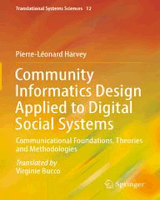
Community Informatics Design Applied to Digital Social Systems: Communicational Foundations, Theories and Methodologies
- Length: 459 pages
- Edition: 1st ed. 2017
- Language: English
- Publisher: Springer
- Publication Date: 2018-03-06
- ISBN-10: 3319653725
- ISBN-13: 9783319653723
This book introduces a Digital Social System Praxis Framework (DSSPF) integrating Computational Media, Evolutionary Systems Thinking and Design Thinking approaches to E-transformation practice, also called Community Informatics Design (CID). The DSSPF framework is intended to create communication spaces dedicated to knowledge production and sharing for social and organizational change. It allows social systems researchers and practitioners to recognize their synergistic roles in the praxis process to shape their future through social innovation projects. This transdisciplinary text provides potential students and practitioners fundamental concepts and tools for such design. It offers resources from the Pragmatic and Systemic philosophy of science for the co-construction of social architectures and infrastructures, and multi-aspectual design methodologies by which government, organizations and civil society can learn to ethically co-design common ground. This approach provides complementary and common patterns from known methods, models, and theories of social systems interventions that could support a generic framing of large scale sociotechnical systems: digital social innovation ecosystem, living Labs, Fab Labs, enterprise collaborative networks.
There will be a particular focus on understanding and addressing the dimensions that make people from different communities of practice able to communicate and collaborate through multiple digital media, design platforms, worldviews and modeling approaches.
Table of Contents
Chapter 1: Global Transformation and Design Principles in the Knowledge Society
Part I: The Field of Community Informatics Design Science: Digital Social Systems’ Theoretical Foundations
Chapter 2: Universal Anteriorities and Third-Phase Science
Chapter 3: Community Informatics Design’s Theoretical Basis
Chapter 4: Community Informatics Design in Action: Towards Operational Ways of Thinking in Order to Start a Design Process (Block 3)
Chapter 5: Generic Communication and Community Informatics Design: Evaluation and Validation of Socio-technical Design of a Universal Communication Platform, the Informatics Design Assistance System, Using the CAPACITÉS Evaluation Model
Chapter 6: Towards a Scientific Collaborative Design Approach: The Construction of a Community Informatics Design Assistance System to Support Communities and Virtual Organizations
Part II: From Modeling to Implantation: the Reference Framework, Instantiation Methodology and the Discovery and Strategic Alignment Matrices
Chapter 7: Reference Model, Governance Framework and Instantiation Strategy
Chapter 8: An Instantiation Methodology and Its Multiple Aspects
Chapter 9: Toward a Discovery and Strategic Alignment Matrices for Socio-technical Systems’ Design
Chapter 10: The Fields and the Definition Taken into Account for the Construction of the Multimodal and Multi-aspect Discovery and Strategic Alignment Matrices (2MDSAM) for the DSS Design
Chapter 11: The Organization and Governance of an Incubation and Learning Environment with the Help of Tool Boxes: Reference Model, Community Informatics Design Framework and Instantiation Methodology
Chapter 12: The Conclusion: Towards a Computerized Modeling Tool for a 2MDSAM with Fully Qualified and Assigned Functionalities







